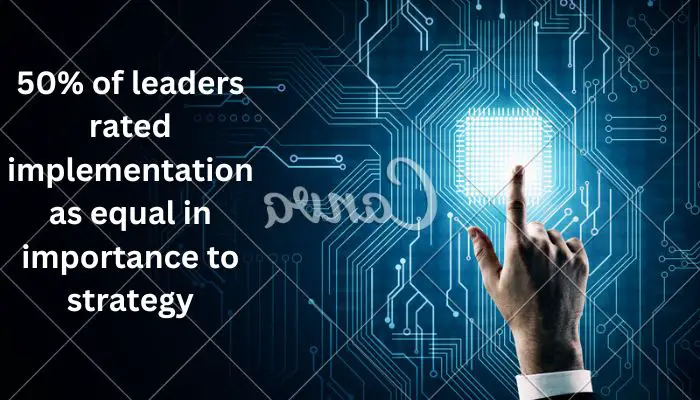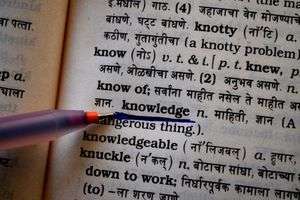Knowledge leadership is a term that has been around for a while, but Knowledge leadership definition is not always clear.
What is knowledge leadership’s definition?
Knowledge leadership refers to harnessing the power of knowledge and using it to lead people and achieve desired outcomes. It creates an environment where people can share their knowledge and work collaboratively to achieve collective success. Knowledge leadership is essential for any organization that wants to stay ahead of the curve.
But what does the knowledge leadership definition mean in practice? How can you become a knowledge leader in your industry? And what are the benefits of doing so?
In this article, we’ll explore the concept of knowledge leadership definition in more depth and look at some of how you can become a knowledge leader in your field. Let’s start.
💡 Helpful Statistic About Leadership:
● 50% of leaders rated implementation as equal in importance to strategy.
● 79% of employees will quit because of a lack of appreciation (absent leadership role in the organization).
● Research has shown that a person who is led well can increase their effort by about 40%.
● US spend $166 billion on leadership development each year, nearly half of the $366 billion spent globally.
● 48% of leaders spend less than a day on strategy each month. (HBS)
● Leadership devotees at least 40% of their time to listen to others. (Importance of communication skill).
● Only 10% of people are natural leaders — another 20% show some qualities of primary managerial talent that can be cultivated into
high-quality leadership.

Table of Contents
Why is knowledge leadership definition important?
Studying the definition is the main entry point to get to know any topic because the definition works on describing the subject in all its aspects in short words.
The definition refers to how leadership uses knowledge; knowledge is the main point in this topic. So let’s focus on the importance of using knowledge in leadership.
Knowledge leadership derives its importance from the importance of knowledge itself. Therefore the following section shows you the importance of learning, reflecting the importance of Knowledge leadership.
Knowledge is power, and the more you know about your industry, your team, and your customers, the better equipped you’ll be to lead them to success.
In our rapidly changing world, the need for knowledge is more important than ever before. Leaders must have a strong understanding of the complex issues and challenges to make sound decisions and achieve success.
The world is in the midst of an unprecedented transformation. Never before has so much change happened so quickly. The pace of change is only going to accelerate in the years ahead, and those who can keep up will be the ones who succeed.
So what is driving all this change? Technology is a big part of it, but even more important is the rise of knowledge. This era is called the age of knowledge, and everything depends on knowledge. Economic success, political power, and military strength all now hinge on the ability to learn and innovate.
Knowledge is essential for leadership because it is the foundation for sound decision-making. Leaders with knowledge can see all sides of an issue, accurately assess the risks and benefits of various courses of action, and make informed decisions that benefit their organizations and themselves.
Leaders without knowledge cannot effectively guide their organizations into the future.
Is knowledge a leadership skill?
There’s no doubt that knowledge is power – but is it also a leadership skill? Therefore, knowledge is information and skills that can be acquired.
You can gain knowledge in many different ways. The most common way to gain knowledge is by learning. You can learn from books, teachers, the internet, and other people.
You can also gain knowledge from experience. Experience is a great teacher. If you do something enough, you will eventually learn how to do it well.
This is especially true when it comes to knowledge in the digital age. With the internet, you have access to more information than you could ever hope to learn in a lifetime. And much of that information is in different languages.
But, acquiring knowledge is not always easy. It takes time and effort to learn new things. And, even after you’ve learned something, it’s not always easy to remember what you’ve learned and put it into practice.
Fortunately, there are ways to make learning more accessible and more effective. And, once you’ve learned the learning skills, you can use them to learn anything you want to know.
Knowledge leadership roles
The definition of knowledge leadership definition refers to several roles that leadership plays to succeed in its mission. The following points will present them in more detail.
A good knowledge leadership will fulfill, as a minimum, the following six roles:
- Knowledge leadership focuses on knowledge in guiding the organization. Knowledge leadership is about harnessing the power of knowledge and how they can use it to achieve desired outcomes.
- Encouraging people to learn and gain knowledge. Knowledge leadership should encourage people to learn and to gain knowledge. They provide the knowledge needed to enable them to learn and gain knowledge. Also, they should use their ability to help people develop and share knowledge.
- Create an environment that supports learning. The knowledge leader must create an environment that is conducive to learning. Create a culture that is open to knowledge and wisdom.
- Serves as a role model in gaining and applying knowledge. Knowledge leadership leads by example.
- Continuous improvement and innovation in information sources, individual skills, knowledge networks, and learning.
- Give attention to knowledge management within the organization in its various stages, such as knowledge acquisition, storage, dissemination, and distribution among employees of the organization
How to become a knowledge leader
So how can you become a knowledge leader? It’s not easy, but it is possible. Here are five steps that can help:
- Make learning a priority: If you want to become a knowledge leader, you must make learning a priority. You’ll spend less time working and more time thinking and understanding if you do. And, you’ll be well on your way to being a knowledge leader.
- Learn from others: If you want to be a knowledge leader, you need to learn from others. That means reading, watching videos, and talking to people already good at what you want to become.
- Learn from your mistakes: Most of us have made mistakes. The key is to learn from these mistakes and avoid making them again. Learning from your mistakes is one of the best ways to ensure that you’ll continue to grow in your field.
- Learn from others’ mistakes: The best way to avoid making mistakes is to learn from other people’s mistakes. When you learn from the mistakes of others, you’ll know what not to do, and you’ll be able to avoid making the same mistakes.
- Don’t be afraid to ask questions: It’s easy to get stuck in your way of doing things, so ask questions.
The following section explains the previous point in more detail:
To become a knowledge leader, you must first take the time and make an effort to learn about your industry, your team, and your customers.
After you learn about the industry, you need to apply your knowledge to your team. This can be done through education, training, mentoring, or personal experience with your team.
Science is all about refining our understanding of the natural world. But to do that, we need to experience what we have learned and give it time to sink in. That’s where you come in. By becoming a knowledge leader, you can help us refine our understanding of the world around us and make a real difference.
What does it mean to be a knowledge leader? It means being deeply committed to learning and growing – both on your own and with others. It means constantly seeking out new information and new ways of looking at the world. And it means sharing what you know with others in a way that is both informative and inspiring.
Finally, it is essential to continuously learn and take the time to gain new knowledge, even if you’re already in a leadership position. By doing so, you’ll be able to stay ahead of the competition and continue to lead your team to success.
Conclusion
In this article, we have looked at the concept of knowledge leadership definition and discussed what it means and how you can become a knowledge leader. We have also looked at the different ways in which knowledge leaders can create value for their organizations. Finally, we looked at the essential roles that knowledge leaders need to do.
What is Knowledge leadership’s definition?
Knowledge leadership refers to someone who can harness the power of knowledge and use it to achieve desired outcomes. It creates an environment where people can share their knowledge and work collaboratively to achieve collective success. Knowledge leaders are essential for any organization that wants to stay ahead of the curve.
What does knowledge leadership mean? It means being deeply committed to learning and growing – both on your own and with others. It means constantly seeking out new information and new ways of looking at the world. And it means sharing what you know with others in a way that is both informative and inspiring.
Knowledge leadership derives its importance from the importance of knowledge itself. Therefore the following section shows you the importance of knowledge, reflecting the importance of Knowledge leadership.
Knowledge is power, and the more you know about your industry, your team, and your customers, the better equipped you’ll be to lead them to success.
There’s no doubt that knowledge is power – but is it also a leadership skill? Therefore, knowledge is information and skills that can be acquired.
To become a knowledge leader, you must first take the time and make an effort to learn about your industry, your team, and your customers.
Finally, it is essential to continuously learn and take the time to gain new knowledge, even if you’re already in a leadership position. By doing so, you’ll be able to stay ahead of the competition and continue to lead your team to success.

